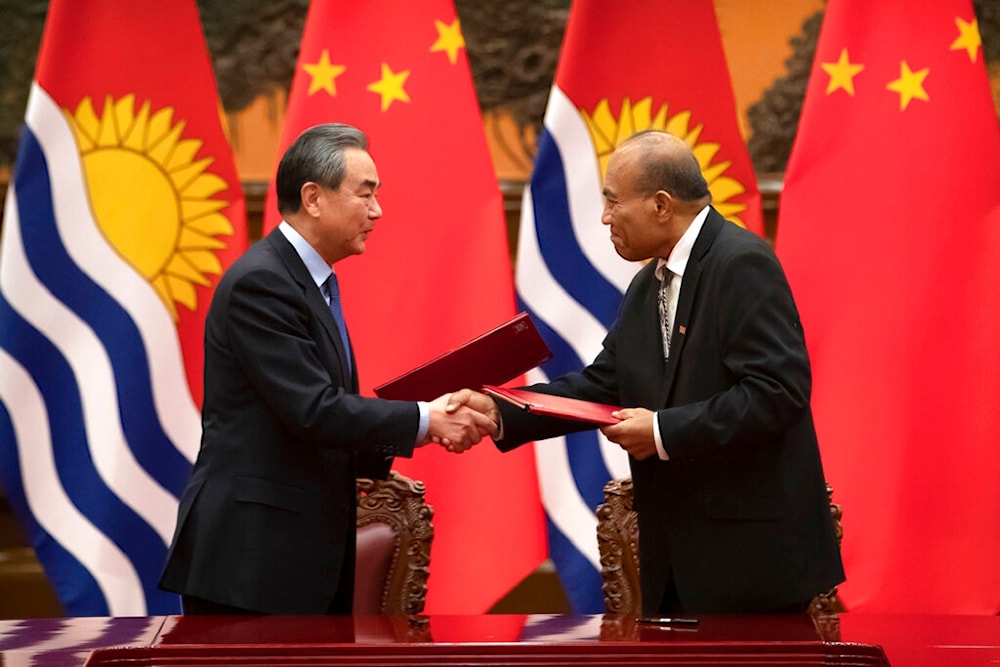Kiribati explores deep-sea mining deal with China
Kiribati initiated discussions with Chinese Ambassador Zhou Limin after a long-standing agreement with leading deep-sea mining firm The Metals Company fell through.
-
 Chinese Foreign Minister Wang Yi, left, and Kiribati's President Taneti Maamau shake hands during a signing ceremony at the Great Hall of the People in Beijing, Monday, January 6, 2020. (AP)
Chinese Foreign Minister Wang Yi, left, and Kiribati's President Taneti Maamau shake hands during a signing ceremony at the Great Hall of the People in Beijing, Monday, January 6, 2020. (AP)
The Pacific island nation of Kiribati has announced that it is exploring a potential deep-sea mining partnership with China, offering access to a vast section of the Pacific Ocean rich in valuable metals and minerals.
China has intensified efforts to strengthen ties with Pacific nations that control lucrative underwater deposits of cobalt, nickel, and copper, recently signing a cooperation agreement with the Cook Islands.
Kiribati initiated discussions with Chinese Ambassador Zhou Limin after a long-standing agreement with leading deep-sea mining firm The Metals Company fell through.
"The talk provides an exciting opportunity to explore potential collaboration for the sustainable exploration of the deep-ocean resources in Kiribati," the government stated on Monday evening.
Kiribati, alongside the Cook Islands and Nauru, is at the forefront of a contentious push to mine the deep sea. The nation holds deep-sea mining exploration rights over a 75,000-square-kilometer expanse in the Clarion Clipperton Zone.
Previously, Kiribati had been working through its state-backed subsidiary, Marawa Research, in partnership with Canada-based The Metals Company to explore mineral deposits. However, The Metals Company confirmed to AFP that the agreement was “mutually” terminated at the end of 2024.
A Kiribati fisheries official stated that the country is now exploring partnerships with other foreign entities. The Metals Company explained that Kiribati’s mining rights were “less commercially favorable” than projects with Nauru and Tonga.
Kiribati’s announcement coincides with a series of crucial meetings by international regulators that could determine the future of deep-sea mining. Industry players, including The Metals Company, are pressing the International Seabed Authority to establish rules permitting large-scale exploitation.
Kiribati, an archipelago threatened by climate change and home to approximately 130,000 people, controls one of the world’s largest exclusive economic zones.
Under President Taneti Maamau, Kiribati severed diplomatic ties with Taiwan in 2019, strengthening relations with China. In recent years, Chinese firms have been granted access to Kiribati’s lucrative fisheries—one of its few natural resources besides minerals. Additionally, a delegation of Chinese police visited the capital, Tarawa, to provide training to local security forces.
Companies are eager to generate billions in revenue by extracting polymetallic nodules from the ocean floor. These rock formations contain high concentrations of manganese, cobalt, copper, and nickel—essential metals for producing electric vehicle batteries.
While nations such as Nauru and Kiribati view deep-sea mining as a pathway to economic growth, neighboring Pacific states like Palau, Fiji, and Samoa strongly oppose it, demanding that environmental concerns be addressed before commercial extraction begins.
Read more: Vanuatu’s new PM plans to reassess 2022 security pact with Australia

 3 Min Read
3 Min Read








